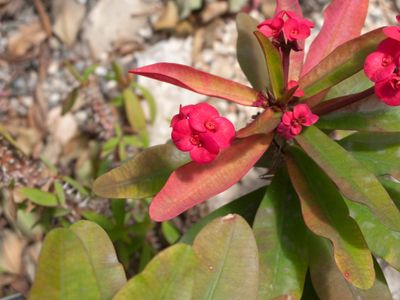Preventing a Frozen Crown of Thorns in Potted Plants
Basically, crown of thorns is treated like a cactus. Although it may be able to tolerate light frost, extended periods of cold below 35 degrees F. (2 C.) will result in a frost-bitten crown of thorns plant. Unlike an in-ground plant, potted crown of thorns is particularly susceptible to damage because the roots have little soil to protect them. If your crown of thorns plant is in a container, bring it indoors in late summer or early fall. Site the plant carefully if you have children or pets that might be harmed by the sharp thorns. A location on a patio or in a basement may be a viable alternative. Also, keep in mind that milky sap from damaged stems or branches can irritate the skin.
Preventing Frost-Bitten Crown of Thorns in Garden
Don’t feed your crown of thorns plant for at least three months before the first average frost date in your area. Fertilizer will trigger tender new growth that is more susceptible to frost damage. Similarly, don’t prune the crown of thorns plant after midsummer, as pruning can also stimulate new growth. If frost is in the weather report, take action immediately to protect your crown of thorns plant. Water lightly at the base of the plant, then cover the shrub with a sheet or frost blanket. Use stakes to keep the covering from touching the plant. Be sure to remove the covering in the morning if daytime temperatures are warm.
Crown of Thorn Plant Froze
Can crown of thorns survive a freeze? If your crown of thorns plant was nipped by frost, wait to trim damaged growth until you’re sure all danger of frost has passed in spring. Trimming earlier may place the plant at further danger of frost or cold damage. Water frozen crown of thorns very lightly and don’t fertilize the plant until you’re well into spring. At that time, you can safely resume normal water and feeding, removing any damaged growth.
